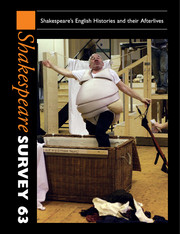Book contents
- Frontmatter
- Shakespeare the Historian
- The Decline of the Chronicle and Shakespeare's History Plays
- Rites of Oblivion in Shakespearian History Plays
- Richard II's Yorkist Editors
- Mapping the Globe: The Cartographic Gaze and Shakespeare's Henry IV Part 1
- Falstaff's Belly: Pathos, Prosthetics and Performance
- ‘And is Old Double Dead?’: Nation and Nostalgia in Henry IV Part 2
- Performing the Conflated Text of Henry IV: The Fortunes of Part Two
- Medley History: The Famous Victories of Henry the Fifth to Henry V
- Georgic Sovereignty in Henry V
- The Troublesome Reign, Richard II, and the Date of King John: A Study in Intertextuality
- The Trials of Queen Katherine in Henry VIII
- ‘Watch Out for Two-handed Swords’: Double-Edged Poetics in Howard Barker's Henry V in Two Parts (1971)
- Daunted at a Woman's Sight?: The Use and Abuse of Female Presence in Performances of the Histories as Cycles
- The RSC's ‘Glorious Moment’ and the Making of Shakespearian History
- Shakespeare as War Memorial: Remembrance and commemoration in the Great War
- Shakespearian Biography, Biblical Allusion and Early Modern Practices of Reading Scripture
- Filling in the ‘Wife-Shaped Void’: The Contemporary Afterlife of Anne Hathaway
- Shakespeare and Machiavelli: A Caveat
- Shame and Reflection in Montaigne and Shakespeare
- Playing the Law for Lawyers: Witnessing, Evidence and the Law of Contract in The Comedy of Errors
- Shakespeare's Narcissus: Omnipresent Love in Venus and Adonis
- Surface Tensions: Ceremony and Shame in Much Ado About Nothing
- ‘Remember Me’: Shylock on the Postwar German Stage
- ‘Dangerous and Rebel Prince’: A Television Adaptation of Hamlet in Late Francoist Spain
- What Shakespeare Did with the Queen's Men's King Leir and When
- Re-cognizing Leontes
- Shakespeare Performances in England 2009
- Professional Shakespeare Productions in the British Isles, January–December 2008
- The Year's Contribution to Shakespeare Studies 1 Critical Studies
- 2 Shakespeare in Performance
- 3 Editions and Textual Studies
- Index to Volume 63
Shakespearian Biography, Biblical Allusion and Early Modern Practices of Reading Scripture
Published online by Cambridge University Press: 28 November 2010
- Frontmatter
- Shakespeare the Historian
- The Decline of the Chronicle and Shakespeare's History Plays
- Rites of Oblivion in Shakespearian History Plays
- Richard II's Yorkist Editors
- Mapping the Globe: The Cartographic Gaze and Shakespeare's Henry IV Part 1
- Falstaff's Belly: Pathos, Prosthetics and Performance
- ‘And is Old Double Dead?’: Nation and Nostalgia in Henry IV Part 2
- Performing the Conflated Text of Henry IV: The Fortunes of Part Two
- Medley History: The Famous Victories of Henry the Fifth to Henry V
- Georgic Sovereignty in Henry V
- The Troublesome Reign, Richard II, and the Date of King John: A Study in Intertextuality
- The Trials of Queen Katherine in Henry VIII
- ‘Watch Out for Two-handed Swords’: Double-Edged Poetics in Howard Barker's Henry V in Two Parts (1971)
- Daunted at a Woman's Sight?: The Use and Abuse of Female Presence in Performances of the Histories as Cycles
- The RSC's ‘Glorious Moment’ and the Making of Shakespearian History
- Shakespeare as War Memorial: Remembrance and commemoration in the Great War
- Shakespearian Biography, Biblical Allusion and Early Modern Practices of Reading Scripture
- Filling in the ‘Wife-Shaped Void’: The Contemporary Afterlife of Anne Hathaway
- Shakespeare and Machiavelli: A Caveat
- Shame and Reflection in Montaigne and Shakespeare
- Playing the Law for Lawyers: Witnessing, Evidence and the Law of Contract in The Comedy of Errors
- Shakespeare's Narcissus: Omnipresent Love in Venus and Adonis
- Surface Tensions: Ceremony and Shame in Much Ado About Nothing
- ‘Remember Me’: Shylock on the Postwar German Stage
- ‘Dangerous and Rebel Prince’: A Television Adaptation of Hamlet in Late Francoist Spain
- What Shakespeare Did with the Queen's Men's King Leir and When
- Re-cognizing Leontes
- Shakespeare Performances in England 2009
- Professional Shakespeare Productions in the British Isles, January–December 2008
- The Year's Contribution to Shakespeare Studies 1 Critical Studies
- 2 Shakespeare in Performance
- 3 Editions and Textual Studies
- Index to Volume 63
Summary
Modern narratives of Shakespeare's life have tended to expand our sense of the playwright's representativeness of his own culture in perhaps every area but one: his use of the Bible. The boundaries of this subject have long been shaped by two biographical assumptions about Shakespeare's encounters with scriptural texts: that they occurred mainly when he was a boy in school and later when he attended church services. Both assumptions have sedimented into part of our cultural memory of Shakespeare that no recent biographer, as far as I am aware, has questioned. They constitute what one might call, following Pierre Bourdieu, the historical field that determines the social value and scholarly production of Shakespeare's discursive relationship with the Bible. The critical result, evident in any modern edition, has been a reduction of Shakespeare's biblical references to the level of proverbial wisdom or unproblematic doctrine. These scholarly tendencies have been reinforced by wider cultural attitudes, such as long-standing admiration for the plays’ absence of religious dogma, as well as wariness of provoking outdated polemics or fanciful speculations about Shakespeare's personal beliefs.
The current consensus has had the less desirable effect, however, of inhibiting historicized investigations of Shakespeare's biblical intertexts and early modern English culture, including potentially diverse responses by original spectators and readers to scriptural allusions in the plays. While modern scholars have catalogued scores of references to the Bible in Shakespeare, most of these remain untouched by recent theoretical discourses and cross-disciplinary methodologies which have transformed Shakespearian historicism in other areas, including early modern contexts of religious politics and the theatre.
- Type
- Chapter
- Information
- Shakespeare Survey , pp. 212 - 224Publisher: Cambridge University PressPrint publication year: 2010
- 1
- Cited by

